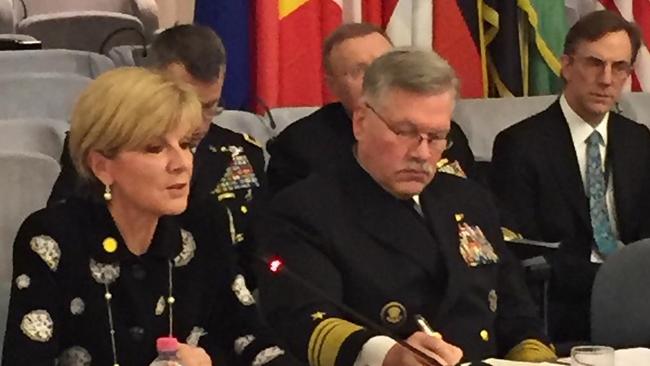Step up to ISIS fight, Middle East urged by Julie Bishop
Julie Bishop has encouraged Middle East countries to take a more active role in the military campaign against IS.

Foreign Minister Julie Bishop has encouraged Middle East countries to take a more active role in the military campaign against Islamic State and promote Islamic moderation to drown out militants’ messages of extremism and violence.
In a blunt message to the Small Group of the Global Coalition meeting in Rome, Ms Bishop told the Middle Eastern countries their voices resonated stronger than any Western voice with those vulnerable to Islamic State’s recruitment efforts.
Most foreign fighters in Syria and Iraq came from surrounding countries and Ms Bishop said the region had to counter the recruitment propaganda with “Islamic moderation’’.
“Countries in the Middle East region must play a leading role and avoid stoking sectarian tensions,’’ she told 23 coalition member countries. “You have a key stake in this counter-narrative and your voice will resonate stronger than any Western voice with those who are vulnerable to Daesh’s recruitment efforts,” she added, using an Arabic acronym for the terrorist group.
“The region has a responsibility to act and we urge you to do much more — not only in countering Daesh’s perverse narrative but also through a commitment to undertake a more active role in the military campaign.’’
Ms Bishop has ruled out expanding Australia’s military contribution to the coalition and said many coalition members agreed with her that other countries had to take a prominent position.
But Australia’s messages — delivered with the authority of a country providing more than 750 military personnel, including 400 troops — have also come with further assistance.
At today’s London conference to raise money to support Syria, Australia will pledge another $25 million and provide 10 Australian Civilian Corps specialists to Jordan and Lebanon, two neighbouring countries that have taken in fleeing Syrian refugees.
Ms Bishop will tell the London conference — being held to bridge a funding shortfall to the UN of its $9 billion Syrian and regional humanitarian budget this year — it is vital that Syrian refugees develop skills necessary to help rebuild their country after the conflict is over and contribute to their host countries.
“Without such opportunities, we risk a lost generation,’’ Ms Bishop said. “We must seek to alleviate the suffering of the Syrian people, and relieve the immense strain on refugee host countries.”
The additional Australian money and staff will be in addition to the $230m in humanitarian help to Syria and Iraq since 2011.
Australia’s military cost, which includes being part of the escalating airstrikes in the region this year and training the Iraqi Security Forces, will top $400m this financial year, while the permanent resettlement of 12,000 Syrian refugees will cost taxpayers $830m over four years.
The Australian Civilian Corps will work with the UN and other agencies on longer-term development issues such as education programs, child protection, providing drinking water and sanitation and logistics.
US Secretary of State John Kerry broadened the coalition front against Islamic State to include Libya, amid fears that the extremists may gain a stranglehold there and exploit its oil revenue. Coalition countries will look at ways to help Libya at meetings next week in Munich and a coalition defence ministers meeting in Brussels.
“In Libya we are on the brink of getting a government of national unity and that will prevent Daesh from turning Libya into a stranglehold on that country’s future; and as everybody knows that country has resources, the last thing in the world you want is a false caliphate with access to billions of dollars in oil revenue,” Mr Kerry said.
Ms Bishop said she was prepared to listen to what the coalition might require from Australia to help secure a stable government in Libya, but she was firm that there would not be an increase in troops on the ground.
‘’I believe there are reasons to be positive about gains against Islamic State but I don’t think anybody is under any illusion (about) how long and difficult the fight will be,’’ she said.
“It is an extremely difficult situation in Syria and the difficult situation in Libya is now part of the focus as well. So it means we need to push full speed ahead with training of security personnel and we need to ensure there is a decisive military edge.’’



